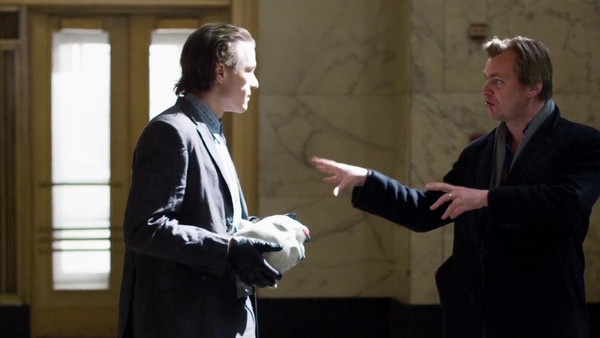The Dark Truth Behind Heath Ledger's Joker
3. Building A New Joker

The look was already different: Christopher Nolan has revealed that his Joker is designed to be a visual homage to the work of artist Franchis Bacon. The same Francis Bacon whose painting Figure With Meat is spared by the Joker during his museum rampage in Tim Burton's movie, in fact. But the difference for Ledger was more than skin-deep.
His director revealed how much Nolan brought to the performance, but back before the film's release, Ledger himself laid some foundation as to why he was so committed to the role and to making it his own.
In an exclusive interview with Empire, Ledger said he feared taking a role that every fanboy around the world would demands to see done right:
"Although anything that makes me afraid I guess excites me at the same time. I don’t know if I was fearless, but I certainly had to put on a brave face and believe that I have something up my sleeve. Something different...”
In the same interview, he laid out some of his approach to preparing for the role too:
"It’s a combination of reading all the comic books I could that were relevant to the script and then just closing my eyes and meditating on it. I sat around in a hotel room in London for about a month, locked myself away, formed a little diary and experimented with voices — it was important to try to find a somewhat iconic voice and laugh. I ended up landing more in the realm of a psychopath — someone with very little to no conscience towards his acts. He’s just an absolute sociopath, a cold-blooded, mass-murdering clown, and Chris has given me free rein. Which is fun, because there are no real boundaries to what The Joker would say or do. Nothing intimidates him, and everything is a big joke"
Ten years on from the release of the film, Nolan explored the same part of the production and revealed how much of the Joker's performance was down to Ledger:
"A lot of what Heath did he would discuss with me. He'd sort of give me hints of what he was going to do, and we'd talk about it a bit and I would try to be an audience for him, sort of gauge with him what he was doing, but… I think he wanted to play his cards a little close to the chest."
Despite Nolan being the director, he revealed that Ledger would come to key decisions himself, gradually revealing his choice of the voice and the way he was going to approach parts of the performance, and there was an unpredictability to him on set that matched precisely the character's make-up.
After viewing the film multiple times - because that's how it deserves to be watched - those decisions become all the more clear. You can see where Tom Waits' various idiosyncracies were hungrily studied and appropriated, you notice that he barely looks at any of his victims, or the tongue-flicking and hand-clapping that were quirks added by Ledger. His physicality, the strange, not-quite-imitatable tone of his voice, the manic spectrum of his delivery of lines... All are artfully crafted. The idea that they are somehow reliant on a mind on the verge of destruction because of their creation is unthinkable. It's also confusing, but there is a point to explore about the psychology of the Joker.
Most interesting of Nolan's comments are the ones that seem to match that idea of the Joker somehow changing Ledger's mind destructively.
"We both had exactly the same concept in our heads of who that guy would be in this film in the way that we'd interpreted it. It wasn't specific to, "Oh, he's going to look like this or talk like that" at all. It was about a psychological concept. It was about a character concept. It was about the threat of anarchy. It was about anarchy being the most frightening thing there is. Chaos and anarchy in this day and age, and I think it is. It's certainly the thing I'm most afraid of."
That idea of approaching a role as a psychological concept has come up before. And when you combine it with the school of method acting that charges an actor with getting into the mind of their character through experience, you can see why there was some belief that it led directly to Ledger's death.
Ledger sought to capture what it would mean to play "someone with very little to no conscience towards his acts" and wrote the diary and temporarily chose to live the life of "an absolute sociopath, a cold-blooded, mass-murdering clown." Of course, there'd be concerns that some residual darkness haunted him.